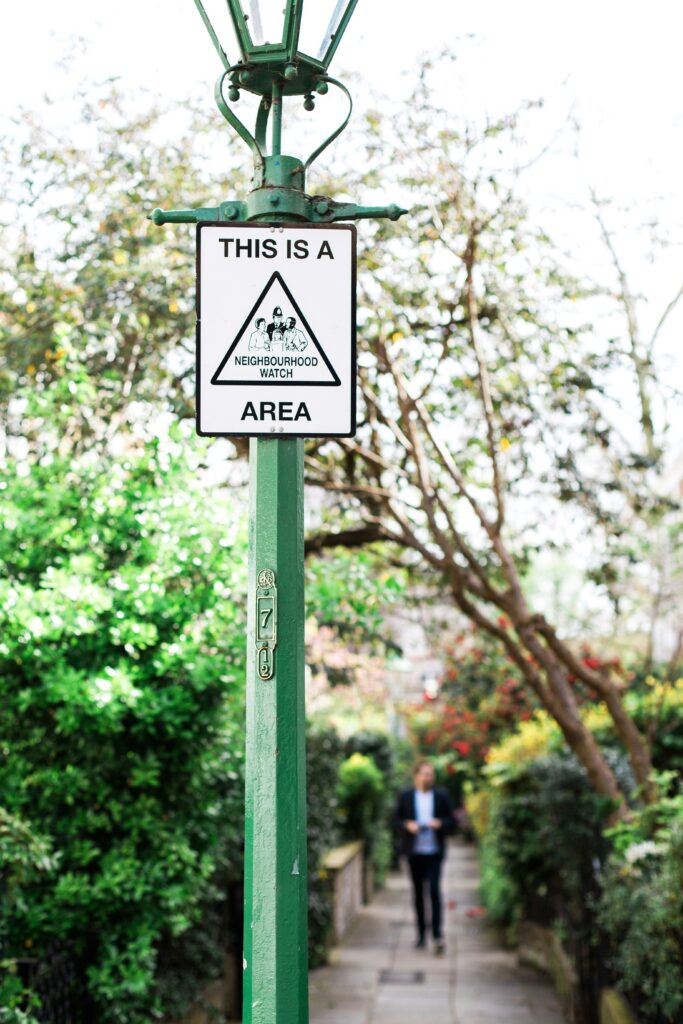Part of Our Ongoing Series on Topics of Concern to Seniors
Every time I turn around, it feels like someone’s telling me: “There’s an app for that.” Everything from shopping and writing to gardening and just making friends can be done with the push of a few buttons on my cell phone — although I guess we’re supposed to call them “personal mobile devices” nowadays. Who can keep up with it all?
Well, I sure can’t. But I did recently do some research into particular scams that target older folks like us. One thing that stood out for me is the danger posed by the proliferation of “neighborhood watch” apps. I’d like to talk a little bit today about my findings.
What They Are
So just what are “neighborhood watch” apps? They’re downloadable applications for our personal mobile devices designed to help us stay connected with our neighbors. By sharing important information about safety and security in our immediate areas, these apps can help us look out for each other.

Public Domain,
https://commons.wikimedia.org/w/index.php?curid=87995599
Sounds harmless, right? More than that, communicating with our neighbors and discussing unusual goings-on in the neighborhood can work for everyone’s advantage and benefit.
As with any good thing, however, there are always going to be a few folks who try to take advantage for their own personal gain. These particular scammers tend to target people that are more likely to trust their neighbors and respect the business recommendations that are posted on these apps without doing a thorough background check on who they’re hiring. Maybe that’s not you, but it sure sounds like me.
Some Specifics
Here’s a listing of some of the most commonly used “neighborhood watch” apps along with a short description of what they do.
- Nextdoor: Nextdoor is a private social network for neighborhoods. It allows residents to connect, share information, and stay informed about local events, crime alerts and safety concerns. Their app is the one I use, and I highly recommend it. It’s easy to use and understand, even for the technologically-challenged folks like me.

Used in Compliance With:
Nextdoor Brand Use Guidelines
- Nextdoor’s “Groups” Feature: Nextdoor also has a “Groups” feature that allows users to create specific groups within their neighborhood for focused discussions on safety, crime prevention, and neighborhood watch initiatives.
- Citizen: Citizen is an app that provides real-time safety alerts and incident updates based on user reports and official sources. It aims to keep users informed about crime and emergencies in their area.
- Ring Neighbors: Neighbors by Ring is an app associated with Ring’s home security products. It allows users to share videos, photos, and safety information with their neighbors and local law enforcement.
- Home by Vivint: Vivint is a home security company that offers an app called Vivant Home. It enables residents to communicate with each other, report suspicious activities, and receive alerts related to their neighborhood’s safety.
- My Local Crime: MyLocalCrime is an app that provides crime data and statistics for specific locations. It allows users to stay informed about crime trends and incidents in their area.
- SpotCrime: SpotCrime is a web-based platform and mobile app that provides crime data and information from law enforcement agencies across the United States. Users can search for crime incidents and sign up for alerts.

Image from Public Sources
https://en.wikipedia.org/wiki/SpotCrime.com
- Citizen Patrol: The Citizen is an app that allows community members to report suspicious activities, share safety concerns, and collaborate with local law enforcement agencies.
- SafeTrek: SafeTrek is a personal safety app that allows users to request emergency assistance by holding down a button on their phone screen. If the user releases the button without entering a personal code, the app automatically alerts local authorities.

So What’s The Scam About?
Here are a couple examples:
Scammers are using some of the apps to pretend they are professional contractors and then charging people money before performing any work. Then they just completely disappear. Good luck finding them.
In addition, some of these crooks will complete a job even though they are not qualified or certified to do so. This forces a homeowner to spend more money on the new damages caused to their property by the fake “professional” they hired. Again, good luck finding the scammers because they’re probably in the next state by now looking for new victims.
Prevention Strategies
So what can we do to protect ourselves from these fraudulent schemes? Well, my research turned up a few suggestions:

- Protect Personal Information: Be cautious about sharing personal information on these apps. Avoid posting sensitive details like your full name or names of family members. And never publicly share things like your exact address or phone number. Use privacy settings to control who can view your profile and personal information.
- Verify Information: When sharing or receiving information on these apps, always try to verify its accuracy before taking any action. Misinformation can spread, so double-check with trusted sources or local authorities when possible.
- Practice Online Etiquette: Try to maintain a respectful and positive tone while interacting with other users. Avoid engaging in arguments or conflicts that can detract from the app’s purpose of fostering community safety and cooperation.

- Report Suspicious Activity: If you encounter suspicious or concerning activity on a particular app, report it to the app’s administrators and/or local law enforcement. Be proactive in reporting any potential threats to ensure timely action can be taken.
- Use App Security Features: Take advantage of the security features provided by these apps. These are things like two-factor authentication and strong passwords. Regularly update the app to the latest version to benefit from security patches and bug fixes.
- Exercise Offline Vigilance: While these apps can certainly help raise on-line awareness, they can never replace real-life vigilance. Always practice basic safety precautions like locking your doors and being aware of your surroundings. Report emergencies directly to the proper authorities by using 911 or similar police and fire hot-lines.
- Protect Personal Information: Be cautious about sharing personal information on these apps. Avoid posting sensitive details like your full name or names of family members. And never publicly share things like your exact address or phone number. Use privacy settings to control who can view your profile and personal information.
So there you have it. Neighborhood watch apps can be excellent tools for enhancing community safety. By providing real-time alerts, crime reporting features and a sense of community engagement, they can empower us to help create safer communities. However, because not everyone using these apps can be trusted, we must exercise caution and good judgment in order to protect ourselves.



